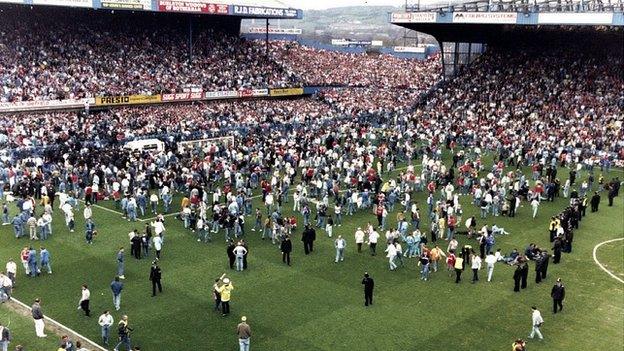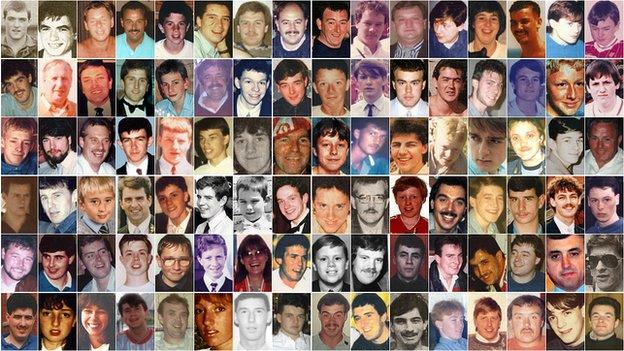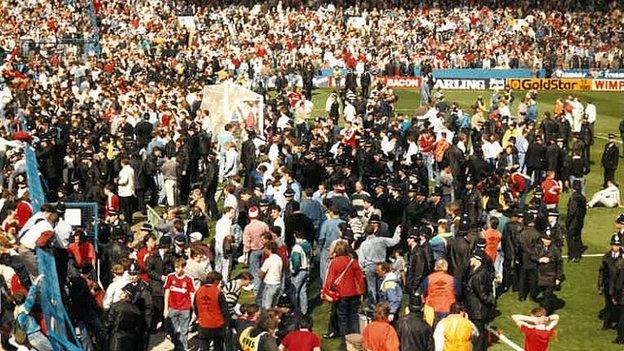Hillsborough Inquests: PC 'felt under pressure to amend statement'
- Published

Ninety-six people were fatally injured following a crush at the FA Cup semi-final in 1989
A police officer feared his statement about the Hillsborough disaster would be "spirited away" if he did not accept changes to it, the inquests have heard.
Maxwell Groome told the jury "a sort of paralysis" had hit the police control room during the 1989 FA Cup semi-final.
The PC said senior officers did not want the junior ranks undermining South Yorkshire Police's command structure.
He described a meeting with a chief inspector during which he was told what needed to be removed from his account.
Ninety-six football fans were fatally injured at the Liverpool versus Nottingham Forest FA Cup semi-final, held at Sheffield Wednesday's Hillsborough stadium.
Mr Groome, who had policed 140 football matches - about half of which were at Hillsborough - was stationed at the Forest end of the ground on the day.
As the disaster unfolded, he told the jury, he helped tear down an advertising hoarding to use as a makeshift stretcher.
He helped fans carry one of the victims, 19-year-old bank clerk Colin Wafer, off the pitch on one of the hoardings.
'Sort of paralysis'
By 18 April, three days after the disaster, Mr Groome said he had written a statement that included a number of criticisms about how the match was policed.
He said the control room "seemed to have been hit by some sort of paralysis" and that "certain supervisory officers were conspicuous by their absence".
The jury saw a copy of his statement in which both sentences containing those phrases had been crossed out.
At the end of the statement, Mr Groome also listed 10 points, eight of which were deleted and one changed.
In one of the removed points he questioned why the 15:00 GMT match kick-off was not delayed, at the time when the Leppings Lane terraces and the West Stand "were not very full, except for the centre pens".
He also asked why there was a "10% reduction in manpower" from the previous year's semi-final, adding: "80 more police officers at the Leppings Lane end could have made a difference filtering the fans."

Who were the 96 victims?

BBC News: Profiles of all those who died

In addition, Mr Groome claimed policing at Hillsborough had become "complacent".
He remarked that the decision to replace an experienced chief superintendent before the semi-final "needs to come under some scrutiny".
In another paragraph, he said: "The deployment of officers around the crucial time needs to come under some scrutiny. Too many were sat around in the gym, whilst other officers were rushed on their feet."
Those comments were also removed.
Mr Groome said he first heard about the need for changes to his statement when three sergeants, whom he knew, approached him.
He told the jury the officers said: "They want you to change this, they want you to change that."
"I just said 'no', you know, 'I'm not changing anything'."
'Failed command structure'
The jury heard that on 30 May 1989, Mr Groome was called to a meeting with Ch Insp Alan Foster at South Yorkshire Police headquarters.
Mr Groome said: "I sat down. He had a copy of my statement in front of him. He started to go through the statement saying 'you can't say that'."
Mr Groome said he asked why not and was told: "Well it criticises senior officers, you can't criticise the command structure."
He added: "I said 'why not - it's failed'."
Mr Groome said the meeting went on "for an hour".
"The main thrust of the thing, it seemed to me," Mr Groome said, "was that they were terrified of junior officers criticising senior officers and therefore in their eyes, undermining the command structure of the South Yorkshire Police, if you like.
"He basically inferred that if I didn't agree to those amendments, the statement... wouldn't be presented to the Taylor Inquiry and that it wouldn't be part of the West Midlands Inquiry and it would be spirited away, you know, disappear."

Maxwell Groome said he wrote a statement that included a number of criticisms about how the match was policed
The jury heard that in a recent statement, Mr Groome said: "Although he didn't say it, I assumed that my statement would be 'magicked' away or disappear, in a box never to see the light of day again, if I hadn't changed it.
"I felt that I would not have had the chance to get my say."
Mr Groome said Ch Insp Foster told him the statement would not go forward to the inquiries into the disaster but did not say outright that it would disappear. He said he "gained the impression" his "account would disappear".
After the meeting the amended statement was sent to him to be signed.
"It came to me and I signed it," Mr Groome said. "I thought if I don't, I'm not going to get the chance to say what I want to say."
When discussing whether he felt pressurised to change his statement, Mr Groome also said that one of his colleagues, PC Michael Walpole, was told he may lose his job - though that threat was not made to Mr Groome.
Asked why he did not make a complaint about what had gone on, Mr Groome recalled how a colleague of his, PC Brookes, had tried to speak to the West Midlands police team investigating the disaster.
Mr Groome said: "He told me what he was going to do and he told me the outcome.
"He said that it was all a Masonic conspiracy and they basically said to him 'can you prove it?' and he said 'no' and they said 'well, there you go'."
'Blame Mr Marshall'
Mr Groome also said he had heard about a "substantial meeting" that took place the day after the disaster.
He claimed senior officers met in temporary offices based in the car park at Hammerton Road police station in Sheffield.
He said the match commander Ch Supt David Duckenfield was there, along with other senior officers.
But Supt Roger Marshall, the officer who had asked for the exit gates at Leppings Lane to be opened, was not present, he said.
Mr Groome said: "As I understand it, the word was, if you like to put it that way, they were trying initially to blame Mr Marshall for asking for the gates to be open."
Asked if there was a link between the officers at the meeting, Mr Groome said: "Being unable to prove it, I believe that most of them were Masons."
Referring to Mr Duckenfield, Michael Mansfield QC, who represents a group of Hillsborough families, asked: "Your belief was he was a Grand Master of a particularly influential lodge?"
Mr Groome replied: "That's right, yes - The Dore Lodge. That again came from the area office."
Asked later why he had not mentioned this meeting in his earlier statements about the disaster, he said to have done so would have been "committing professional suicide".
After the day's evidence, the coroner Lord Justice Goldring spoke to the jury about the alleged meeting.
He said: "I should say this quite clearly to you, we have no other evidence than this rumour, said to emanate from the area office."
The inquests, sitting in Warrington, continue.
- Published16 December 2014

- Published15 December 2014
